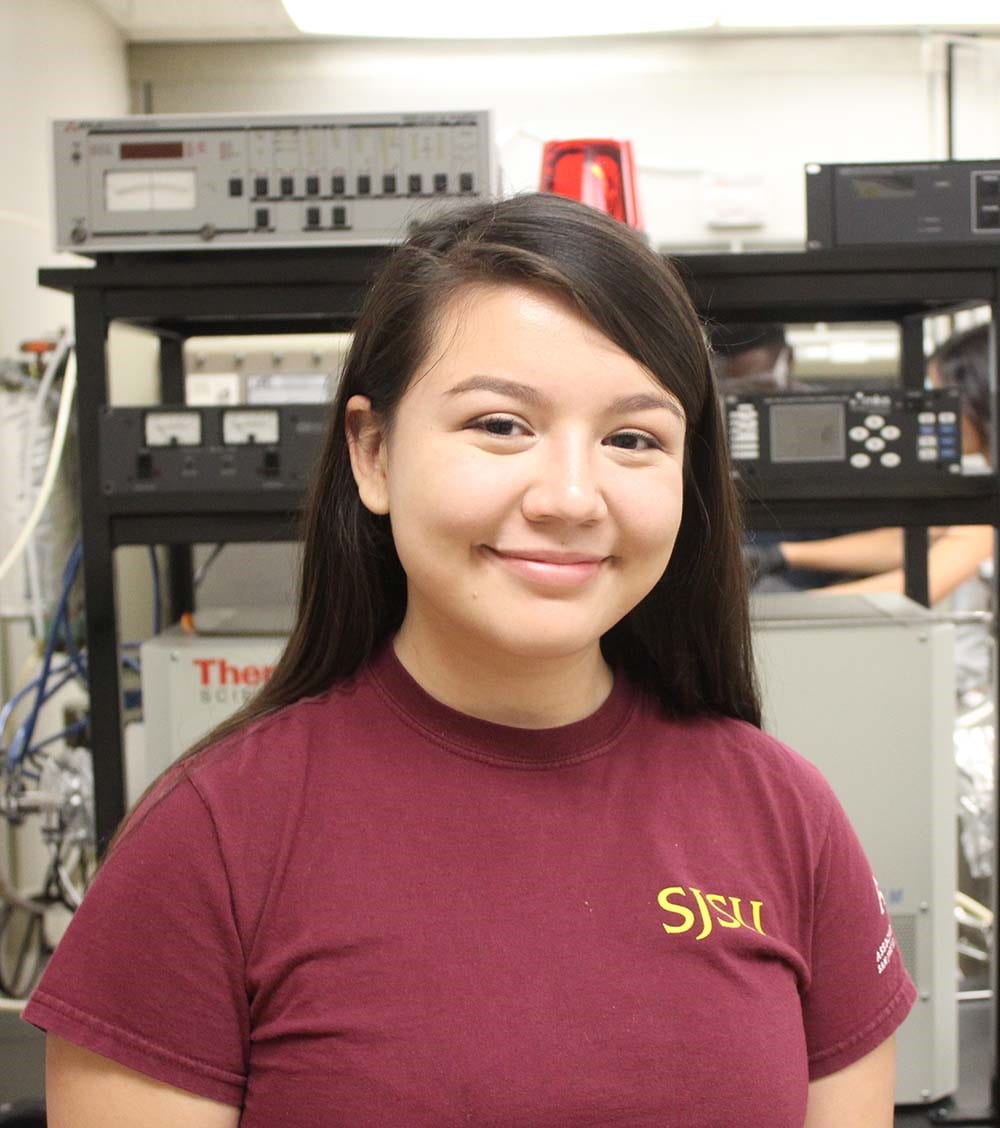
Nebat Ali, ’19 Biological Sciences, has received an NSF graduate research fellowship.
Nebat Ali, ’19 Biological Sciences, felt huge excitement and validation when she learned in March she had received a National Science Foundation Graduate Research Fellowship Program (NSF GRFP), one of two SJSU students honored this year.
“It was so affirming to me as a young scientist because it means students like myself really do belong in academic research labs,” she said.
Ali, who graduated from San Jose State last year, and senior Jocelyn Valenzuela, who will graduate with a degree in chemical engineering, were among the 2,076 fellowship winners across the nation who will be pursuing academic science research at the highest levels.

Jocelyn Valenzuela, ’20 Chemical Engineering, has received an NSF graduate research fellowship.
“The NSF fellowship will give me more options for selecting projects and mentors that will help me pursue my research passions,” said Valenzuela. “I couldn’t have done this by myself without the help from my professors and other students here.”
The NSF GRFP is the country’s oldest fellowship program that directly supports graduate students in STEM fields. Winners of the fellowship receive a stipend and tuition support amounting to $46,000 per year for three years.
“This is as good as it gets,” said Pamela Stacks, SJSU Associate Vice President for Research. “The NSF honors academic excellence, and we’re enormously proud of our talented students who gain genuine respect, confidence and independence with this fellowship.”
NSF GRFP has a long history of selecting recipients who achieve high levels of success in their future academic and professional careers. The reputation of the GRFP follows recipients and often helps them become lifelong leaders who contribute significantly to both scientific innovation and teaching.
Stacks said the NSF program also validates the role of research and strong academic preparation on campus. “Even though San Jose State and other schools in the CSU system are often seen as ‘teaching universities,’ our commitment to research is incredibly strong,” she said. “We’re preparing outstanding young scientific researchers who definitely can hold their own among students from other top universities.”
Over the past six years, 18 SJSU students have received NSF GRFP fellowships, and another 11 have received honorable mentions. Three other San Jose State students received honorable mentions this year: Austin Betancourt and Anjum Gujral in the field of ecology and evolution, and Michelia Dam in chemistry.
“This is a consistent record of accomplishment that speaks well of our efforts to encourage our students to pursue scientific research,” said Cleber Ouverney, professor of biological sciences who also heads the San Jose State’s Maximizing Access to Research Careers program (MARC).
MARC is sponsored by the National Institutes of Health to provide support for undergraduate students who are underrepresented in biomedical sciences to engage in research and improve their preparation for high-caliber graduate training at the PhD level.
“We have several programs on campus that offer a practical framework for students interested in scientific research but who often face a range of challenges that can frustrate their ambition,” said Ouverney. “However, through a combination of some financial assistance, close support from our faculty, and a peer network that provides encouragement, we’ve been able to successfully prepare our students for the rigors of graduate school.”
As a chemical engineering major, Valenzuela’s research work at SJSU concentrated on nanoscale materials and their potential for medical applications such as early cancer detection. She’s worked in the labs with professors Abraham Wolcott in physical chemistry and Katy Kao in chemical engineering. Valenzuela will be starting her PhD program in chemical engineering at Stanford this fall.
“I’m looking forward to using the knowledge and skills I learned at San Jose State and the genuine collaboration I’ve found in both academic and industry labs to pursue basic research that can result in real world benefits,” she said.
While at SJSU, Ali worked with Associate Professor of Biological Sciences Miri VanHoven’s lab in the field of neurological science looking into molecular and genetic mechanisms of neural development and behavior. Now a first-year PhD student at University of California, San Francisco, she’s focusing on microbiology and the impact of microbes on higher organisms.
“I’m truly grateful for all the support I received at San Jose State that helped me become competitive for the NSF award,” said Ali. “The MARC program especially was valuable to me because of the mentorship from my professors and the community of students who help each other prepare applications and proposals.
Ali and Valenzuela are both eager to get back to their respective lab benches as soon as the coronavirus crisis has passed.
—David Vossbrink
